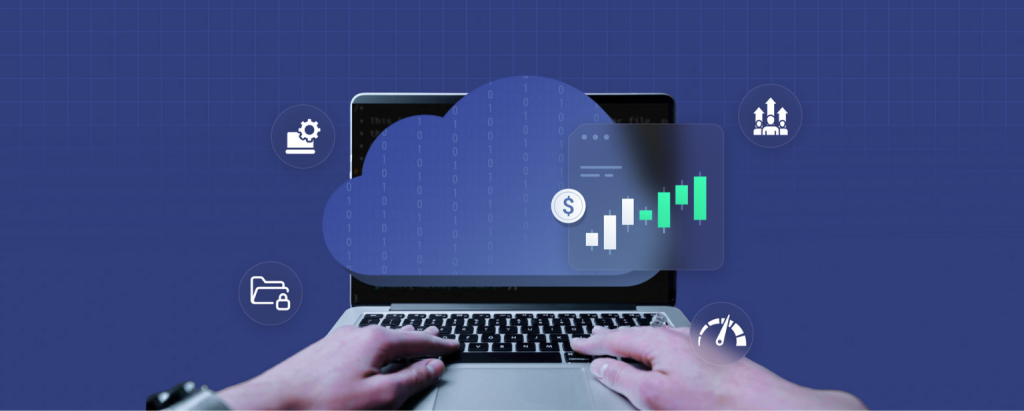Summary: FinTech Cloud Services are transforming how financial platforms operate by improving security, boosting performance, and enabling fast, cost-efficient scalability. This blog explores why cloud-driven architectures are essential for building reliable and future-ready FinTech products.
The financial industry has changed more in the last five years than it did in the decade before. Users expect instant transactions, zero downtime, airtight security, and seamless experiences no matter which device they use. For FinTech companies, meeting these expectations is not optional. It’s the foundation of survival and growth. And this is exactly where FinTech Cloud Services step in as the backbone of modern financial products.
Whether you’re building a digital payments app, an online lending platform, a robo-advisory product, or a neobank, the cloud determines how efficiently you scale, secure, and manage your entire tech ecosystem. Combined with the power of DevOps for FinTech, cloud-driven systems enable faster releases, stronger compliance, and higher reliability while keeping operational costs under control.
In this blog, we’ll dive into why cloud adoption is now mission-critical for financial platforms, the biggest advantages, industry challenges, and how integrating cloud + DevOps unlocks long-term growth.
Why FinTech Cloud Services Are Becoming the Industry Standard
FinTech companies deal with massive amounts of sensitive data, fluctuating traffic, and rapidly evolving regulatory requirements. Traditional on-premise systems simply cannot keep up.
FinTech Cloud Services solve this with the ability to scale instantly, store data securely, and run high-availability environments without heavy upfront investment.
Here’s why the cloud has become the default choice:
1. Explosive user growth
FinTech platforms can experience sudden traffic surges during festivals, salary days, financial events, or marketing campaigns. Cloud-based auto-scaling handles high loads without downtime.
2. Regulation-friendly architecture
With the right configuration, the cloud supports RBI, PCI-DSS, ISO 27001, SOC 2, and GDPR compliance requirements.
3. Faster product evolution
Combined with DevOps for FinTech, teams deploy new features quickly, run automated tests, and minimize human error.
4. Lower infrastructure cost
You pay only for what you use. No maintenance. No large hardware investments.
How FinTech Cloud Services Strengthen Security & Compliance
Security is the most sensitive area for any financial platform. The trust of millions depends on it.
Modern FinTech Cloud Services provide end-to-end security that protects data at every level, including:
Multi-layer Encryption
Data is encrypted at-rest and in-transit using modern algorithms.
Sensitive data tokenization
Important for digital payments, lending, wallets, and KYC systems.
Identity & Access Management (IAM)
Ensures only authorized users can access critical systems.
Zero Trust Architecture
Every user, device, or request must be verified.
Threat detection & 24/7 monitoring
AI-driven systems detect suspicious behavior instantly.
Audit logs for compliance
Critical for meeting RBI, PCI-DSS, and SOC 2 requirements.
The cloud’s built-in security paired with DevOps for FinTech ensures frequent security patches, automated vulnerability scans, and faster fixes without impacting uptime.
When cloud and DevOps work together, your platform becomes safer, more stable, and fully compliant.
Boosting Performance & Speed with FinTech Cloud Services
Speed is everything in FinTech. Users expect apps to load instantly, payments to process in seconds, and workflows to run flawlessly.
Here’s how FinTech Cloud Services boost performance:
1. Global Content Delivery Networks (CDN)
Delivers app content faster across geographies.
2. Optimized server configurations
Load balancers, caching, and microservices ensure top-tier app performance.
3. High-availability architecture
Even if one server fails, the system stays live.
4. Real-time processing
Perfect for stock trading apps, lending engines, UPI/payments, and risk analytics.
5. Serverless capabilities
Run functions on demand without needing a dedicated server.
When combined with DevOps for FinTech, performance monitoring becomes continuous, enabling quicker diagnosis and instant scaling during peak hours.
How FinTech Cloud Services Enable Massive Scalability

FinTech companies rarely grow at a steady pace they scale fast, unpredictably, and globally.
Cloud gives them the flexibility to scale infrastructure as fast as the business grows.
Key scalability benefits include:
Auto-scaling rules: The system automatically increases or decreases resources based on traffic.
Microservices architecture: Breaks the product into independent components for faster development and scaling.
Modular deployments using DevOps: Because DevOps for FinTech promotes automation and CI/CD, scaling becomes smoother.
Horizontal scaling: Add more servers instantly without downtime.
Cloud scalability ensures your FinTech platform never crashes during crucial moments such as loan disbursement hours, salary days, tax-filing seasons, or financial product launches.
Cost Optimization with FinTech Cloud Services
FinTech companies attract millions of users but must be extremely mindful of operational costs. Cloud provides:
- Pay-as-you-go pricing
- No hardware investment
- No server maintenance
- Automated backups
- Lower development cost with ready-made cloud tools
Teams can allocate saved budgets to R&D, marketing, product expansion, or security enhancements.
This cost-efficiency becomes even stronger when DevOps for FinTech automates CI/CD pipelines, reduces manual work, and avoids deployment failures.
DevOps for FinTech: The Perfect Partner to Cloud Adoption
Cloud alone is powerful but cloud + DevOps together unlock maximum impact.
How DevOps complements FinTech Cloud Services:
1. CI/CD Pipelines
Deliver updates faster and more reliably.
2. Infrastructure as Code (IaC)
Automates everything deployment, scaling, configuration, rollback.
3. Faster bug fixes
Real-time monitoring and automated testing identify issues instantly.
4. Reduced downtime
Blue-green deployments ensure zero service interruption.
5. Stronger security
DevSecOps integrates security checks into every release cycle.
Using DevOps for FinTech makes product launches safer, faster, and significantly more cost-efficient.
Real-World Use Cases Showing the Power of FinTech Cloud Services
Here are examples of how cloud technology transforms FinTech operations:
1. Digital Payments
Cloud supports real-time transaction processing, fraud detection, and 99.9% uptime.
2. Online Lending Platforms
Loan scoring, risk analysis, and KYC verification operate more efficiently.
3. WealthTech & Robo-advisory
AI models, portfolio calculations, and analytics run faster in the cloud.
4. Insurtech
Cloud automates underwriting, claims processing, and customer profiling.
5. NeoBanking
Microservices, user authentication, and transaction management scale smoothly.
Across all these use cases, FinTech Cloud Services enable faster deployments while DevOps for FinTech ensures stability.
Challenges FinTech Companies Face Without Cloud Services
If a FinTech startup avoids cloud adoption, it may encounter:
- Slower application performance
- Higher operational costs
- Difficulty meeting compliance requirements
- Increased risk of security breaches
- Inability to scale during growth
- Slower product development cycles
This is why FinTech Cloud Services are no longer optional; they’re essential.
Future of FinTech Cloud Services
The next wave of FinTech innovation will be driven by:
- AI-based fraud detection
- Blockchain integrations
- Cloud-native payment gateways
- Hyper-personalized financial experiences
- Advanced DevSecOps
- Global expansion at lower costs
Cloud environments will continue to play a dominant role in how financial products evolve and scale.
Conclusion: Cloud + DevOps Is the Future of FinTech
To grow in a competitive financial ecosystem, FinTech platforms must prioritize security, reliability, and scalability.
FinTech Cloud Services provide the perfect foundation by ensuring speed, compliance, performance, and cost efficiency while DevOps for FinTech accelerates development and maintains uptime.
Together, they enable FinTech companies to innovate faster, earn user trust, and deliver world-class digital experiences.







